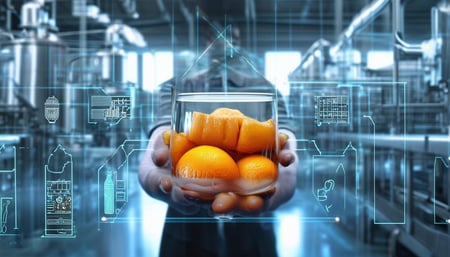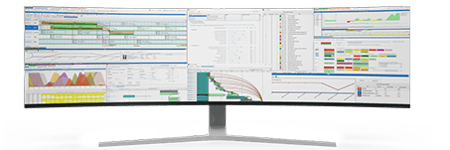Integrating Sustainability and Longevity into Digital Transformation
The Food and Beverage (F&B) manufacturing industry is experiencing a seismic shift driven by the need for digital transformation. At the same time, there is growing pressure to integrate sustainability practices into every aspect of the business. The convergence of these two critical themes—digital transformation and sustainability—presents both challenges and opportunities for manufacturing IT managers.
In this blog, we'll explore how manufacturing IT leaders in the F&B sector can successfully integrate sustainability into their digital transformation strategies. We will also highlight the role that enterprise systems like SAP, Oracle, Microsoft, Kinaxis, and Aveva can play in achieving these goals, with a specific focus on integrating PlanetTogether Advanced Planning and Scheduling (APS) software.

The Push for Digital Transformation
The F&B industry, long reliant on traditional processes and machinery, is now under immense pressure to modernize. This push for digital transformation is driven by several factors:
- Increasing consumer demand for transparency and sustainability: Consumers are more aware than ever of the environmental impact of the products they consume, pushing manufacturers to implement sustainable practices.
- Complex supply chains: Global supply chains are growing more complex, requiring advanced systems to track, plan, and optimize production.
- Operational efficiency: The need to drive down costs while improving operational efficiency demands digital tools that enable real-time visibility and decision-making.
- Regulatory compliance: Government regulations around food safety, quality, and environmental impact continue to evolve, requiring manufacturers to adopt systems that ensure compliance.
However, digital transformation is not just about upgrading technology; it’s about rethinking how every facet of the business operates. And in the current global climate, sustainability must be at the forefront of this transformation.

Sustainability: A Core Pillar of Modern Manufacturing
Sustainability has become a non-negotiable aspect of modern manufacturing, particularly in the F&B sector. The environmental impact of manufacturing operations is under increased scrutiny, with governments, investors, and consumers demanding more eco-friendly practices. For F&B manufacturers, this means:
- Reducing waste: Efficient use of raw materials to minimize waste.
- Energy efficiency: Implementing processes that reduce energy consumption.
- Water conservation: Water-intensive processes need to be optimized for conservation.
- Carbon footprint reduction: Reducing greenhouse gas emissions through better logistics, energy use, and resource planning.
Integrating sustainability into digital transformation is critical to ensure that modernization efforts are future-proof and aligned with these global demands.
![]()

The Role of Enterprise Systems in Sustainability and Digital Transformation
As IT managers in F&B manufacturing facilities, you play a pivotal role in selecting and integrating the right enterprise systems to meet the company’s sustainability and digital transformation goals. Systems such as SAP, Oracle, Microsoft Dynamics, Kinaxis, and Aveva offer powerful capabilities to streamline operations, optimize resource use, and provide the visibility needed for sustainable production.
But how can these systems be used to balance the twin goals of sustainability and operational efficiency? And where does PlanetTogether fit in?
SAP: The Backbone of Integrated Sustainability Initiatives
SAP is one of the most widely used enterprise resource planning (ERP) systems in the F&B manufacturing industry. With its strong focus on data integration and real-time analytics, SAP is well-positioned to drive both digital transformation and sustainability efforts.
SAP's sustainability management tools, including SAP Environment, Health, and Safety (EHS) and SAP Product Footprint Management, enable manufacturers to track and manage their environmental impact. These tools help measure and reduce emissions, waste, and energy consumption across the entire supply chain.
By integrating PlanetTogether APS with SAP, F&B manufacturers can further enhance their sustainability efforts. PlanetTogether’s advanced scheduling and planning capabilities enable facilities to optimize production schedules to minimize energy consumption during high-demand periods, reduce material waste through smarter planning, and improve overall resource efficiency. The integration between PlanetTogether and SAP can be particularly valuable in facilities that rely on just-in-time (JIT) inventory management, as it allows for better synchronization between demand forecasting and production planning.
Oracle: Leveraging Data for Sustainable Decision-Making
Oracle offers a suite of cloud-based tools that help F&B manufacturers streamline operations, manage supply chains, and ensure product quality. Oracle's sustainability solutions are designed to help businesses reduce their carbon footprint and operate more sustainably by providing insights into energy consumption, emissions, and waste across the production lifecycle.
The integration of PlanetTogether APS with Oracle Cloud ERP or Oracle SCM can further improve sustainable manufacturing practices by optimizing the use of raw materials, reducing downtime, and improving production efficiency. By leveraging Oracle’s data analytics and machine learning capabilities alongside PlanetTogether’s planning algorithms, manufacturers can predict energy usage, plan production to avoid peak energy costs, and minimize waste.
For example, a facility using Oracle SCM can utilize the demand planning and procurement features to forecast the exact materials needed for production. When integrated with PlanetTogether, these forecasts can be converted into optimized production schedules that ensure the best use of resources with minimal waste and energy usage, aligning perfectly with sustainability goals.
Microsoft: A Unified Platform for Sustainable Growth
Microsoft Dynamics 365, with its powerful cloud infrastructure and suite of business applications, has become a strong player in the F&B manufacturing sector. One of the key advantages of Microsoft Dynamics 365 is its ability to integrate seamlessly with other Microsoft tools, such as Azure IoT and Power BI, enabling manufacturers to leverage data-driven insights for both operational efficiency and sustainability.
The integration of PlanetTogether APS with Microsoft Dynamics 365 enables manufacturers to take advantage of the platform’s robust data analytics capabilities. For example, production schedules can be optimized based on real-time data from IoT sensors, allowing for energy-efficient production runs and reduced waste. Power BI’s advanced analytics and visualization tools can further enhance this integration, giving IT managers the ability to monitor key sustainability metrics, such as energy usage, water consumption, and waste reduction, directly from the production floor.
Microsoft’s commitment to sustainability extends beyond its tools, as the company itself has committed to becoming carbon negative by 2030. This ethos resonates with manufacturers looking to integrate their digital transformation efforts with long-term sustainability goals.
Kinaxis: Supply Chain Optimization with Sustainability in Mind
Kinaxis is renowned for its supply chain management and planning solutions. In the F&B sector, Kinaxis helps companies optimize inventory levels, reduce lead times, and respond to fluctuating demand. But what makes Kinaxis particularly suited to sustainability efforts is its ability to provide real-time supply chain visibility, enabling manufacturers to minimize waste and optimize resource use.
By integrating PlanetTogether APS with Kinaxis RapidResponse, manufacturers can create a more sustainable supply chain by optimizing production planning and resource allocation. Kinaxis’s demand-sensing capabilities can be used to forecast market demand accurately, while PlanetTogether can ensure that production schedules align with sustainability goals, such as minimizing energy usage during off-peak hours or reducing excess inventory that could go to waste.
Furthermore, the ability of Kinaxis to provide end-to-end visibility into the supply chain helps manufacturers identify inefficiencies that contribute to increased energy consumption or waste, enabling more informed decision-making around sustainability.
Aveva: Bridging IT and OT for Sustainable Manufacturing
Aveva, a global leader in industrial software, focuses on bridging the gap between operational technology (OT) and information technology (IT). In F&B manufacturing, Aveva’s solutions are used to monitor, control, and optimize industrial processes. Its focus on real-time data analytics and visualization makes it an ideal platform for manufacturers aiming to improve sustainability alongside digital transformation.
The integration of PlanetTogether APS with Aveva’s MES (Manufacturing Execution System) solutions allows manufacturers to create a truly holistic production environment. PlanetTogether can optimize production schedules based on data from Aveva’s real-time monitoring systems, ensuring that equipment runs at optimal efficiency, reducing energy consumption and wear-and-tear. This not only improves sustainability but also extends the longevity of machinery, reducing the need for costly replacements and downtime.
Aveva’s commitment to sustainability is evident through its software’s ability to track and report on key sustainability metrics, such as energy usage and carbon emissions. When combined with PlanetTogether’s scheduling capabilities, IT managers can ensure that production schedules are designed to minimize environmental impact while maximizing efficiency.

Key Considerations for IT Managers in F&B Manufacturing
As an IT manager in the F&B industry, you are at the forefront of integrating digital transformation with sustainability efforts. The following considerations are essential when planning your next steps:
- Integration capabilities: Ensure that any new system, whether it’s SAP, Oracle, Microsoft, Kinaxis, or Aveva, can integrate seamlessly with your existing systems, including PlanetTogether APS. Integration is key to achieving real-time data visibility and optimizing for sustainability.
- Data analytics: The ability to collect, analyze, and act on data is critical. Look for systems that offer advanced analytics and reporting tools that allow you to track sustainability metrics alongside operational performance.
- Cloud infrastructure: Cloud-based systems offer scalability and flexibility, which are essential for long-term digital transformation. They also allow for greater collaboration across departments and supply chains, which can lead to more sustainable practices.
- Sustainability reporting: Make sure that the systems you implement can track and report on sustainability metrics, such as carbon emissions, energy consumption, and waste production. This will be increasingly important as regulatory requirements continue to evolve.
- Training and change management: Finally, digital transformation is not just about technology. It’s about people. Ensure that your teams are adequately trained on new systems and that there is a clear change management strategy in place to support the transition.
Integrating sustainability and longevity into your digital transformation strategy is no longer a choice—it’s a necessity. As an IT manager in the F&B manufacturing industry, you have the unique opportunity to drive both innovation and sustainability through the smart integration of enterprise systems like SAP, Oracle, Microsoft, Kinaxis, Aveva, and PlanetTogether.
By leveraging the strengths of these platforms alongside advanced planning tools like PlanetTogether, you can optimize production processes, reduce waste, minimize energy consumption, and meet the growing demands for environmental responsibility. The key is not just in adopting new technologies but in ensuring that they work together harmoniously to create a sustainable and future-proof manufacturing environment.
In doing so, you will not only enhance operational efficiency but also contribute to a more sustainable planet, all while ensuring your facility remains competitive and compliant with evolving regulations.
Are you ready to take your manufacturing operations to the next level? Contact us today to learn more about how PlanetTogether can help you achieve your goals and drive success in your industry.
Topics: Digital Transformation, PlanetTogether Software, Integrating PlanetTogether, Food and Beverage Manufacturing, Sustainability and Longevity, Leveraging Data for Sustainable Decision-Making, Unified Platform for Sustainable Growth, Supply Chain Optimization with Sustainability




















LEAVE A COMMENT